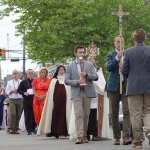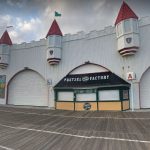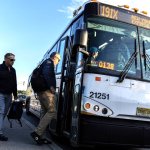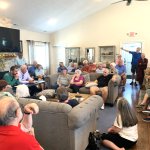To access the Herald’s local coronavirus/COVID-19 coverage, click here.
RIO GRANDE – Pastor Jeff McLeod’s Rio Grande Bible Church faces a decision on Sunday. The pastor and the congregation want to hold a drive-in worship service. Middle Township Police, acting in accordance with the directives they have received concerning Governor Murphy’s Executive Order banning public gatherings of 10 or more, say the church service would violate the law.
The conflict of perceived constitutional protection for religious worship and the boundaries of executive orders meant to protect the public health is playing out across the country.
McLeod says he held a drive-in service last week and all went well. “We had about 27 cars, spaced and on angles from each other,” McLeod added. He said a member of the congregation who is also a volunteer fireman made sure that the cars were parked and angled in such a way that everyone was 10 feet or more apart. He also said those in attendance wore masks and were required to stay in their cars with window cracked only an inch to allow audio from the speakers.
For McLeod this was a way to worship God and still maintain social distancing so necessary to the protection of his flock. “I have many elderly people in the congregation,” he said. “I would never want to endanger them.”
McLeod is not someone who believes the dangers from COVID-19 are overstated. “This virus is real,” he said repeatedly.
Following that service one week ago, McLeod heard from the township police. He said he was told that the gathering was a violation of the Governor’s order and if he persisted in having the service, he and those who participate could be subject to fine or arrest.
Chief of Police Christopher Leusner acknowledged the conversations with the pastor and said the police had offered ideas for how to structure the service so that it complied with the Executive Order.
Leusner suggested that the church hold multiple, separate services at alternate times with no one service involving more than 10 participating individuals. “That would be in compliance with the order,” Leusner said.
“The last thing the Middle Township Police want to do is break-up a religious service,” Leusner said. In this instance the police have no choice but to enforce the law as it has been given to them. “Police do not get to decide which laws to enforce,” Leusner said.
For McLeod, the choice is not that difficult. “Liquor stores are open as long as they practice social distancing, but church services that do the same are banned,” he said. For the police, it comes down to a gathering of more than 10 individuals in a single place. For the church, following the social distancing guidelines should be enough to allow people to practice their religion as a constitutional guarantee.
Innovation has become the hallmark of people’s efforts to stay safe from the pandemic and still practice some semblance of interaction around worship and other necessary human interactions. The ability to do this, many argue, is what makes the commitment to voluntary isolation and distancing possible.
Cape May County has seen drive-by birthday celebrations and even drive by funerals, where individuals in the solitude of their automobiles still acknowledge their oneness in a time of crisis.
Admittedly parked cars in a lot for a joint service is different than a drive-by acknowledgment, but is it so different that it justifies a constraint on civil liberties specifically enshrined in the constitution. That’s the debate playing out in the country.
In one case in Greenville, Mississippi, parishioners who had participated in a drive-in service were fined $500 by police enforcing a municipal ban on large gatherings. The Baptist Temple Church went to court saying the parishioners had been spaced according to CDC gridlines as they listened to a service from within their closed cars.
The church claimed that it was the victim of a ban that targeted religious conduct. They claimed the order was not applied neutrally to secular and religious activities. The federal government jumped into the lawsuit when the Department of Justice (DOJ) supported parishioners. DOJ claimed that the law prohibiting the services infringed on guaranteed constitutional First Amendment rights.
In what is known as a statement of interest, DOJ said it was supporting Temple Baptist Church in its lawsuit. The city responded by withdrawing the fines. The order was later rescinded probably making the litigation moot.
The Shield of Faith Family Church of Fontana, California, has sued over Governor Gavin Newsom’s similar restrictions on religious gatherings. Others have followed.
McLeod said that he is waiting for word from the Christian Law Association before deciding if he will hold the service Sunday in defiance of the ban which the police say they will enforce.
In a statement the Christian Law Association speaks of a “crisis of religious freedom” growing out of various state orders prohibiting gatherings for worship. Churches are being told they are “non essential” and are ordered to stop assembling while alcohol and cannabis stores can remain open, the statement says.
McLeod argues a double standard is in play. He says that when the county resisted becoming a “sanctuary county” for illegal immigrants it fought against state directives in a way that it is not doing to protect religious service.
Leusner points to that same example as one that shows how the process should work. “When the Sheriff disagreed with the Attorney General’s directive on immigration enforcement, he continued to follow the directive and then went to court with his concerns.” Leusner said.
Just like Sheriff Nolan in that instance, Leusner says the police have to enforce the law. Leusner made no statement about his personal beliefs; instead he steadfastly took the position that the police do not make the laws or have a choice in whether or not to enforce them.
Asserting freedoms in the midst of a pandemic is a heavy lift. A state’s authority to act in the protection of the public health is usually given fairly wide latitude. Yet, some argue that a solution to the right to safely attend religious services is necessary.
“For a Christian, gathering for worship is as important as food,” McLeod says.
For the most part, churches feel they have done their part. The Vatican closed holy week services due to the dire state of the contagion in Italy. Religious groups across the country have been observing the restrictions while hoping for a solution.
While the Pew Foundation research shows church service attendance declining, still 45% of Americans gather for communal worship at least monthly or more often.
A court fight may not be the best solution in that experts fear such a path is liable to set precedents that may constrain future efforts to protect the public. The dilemma is as real as the virus.
This story will be updated following the Sunday service or lack thereof.
A statement from the Prosecutor’s Office stated, “During the COVID-19 pandemic, law enforcement’s primary responsibility of public safety includes making sure that the public health is protected by limiting contact between people, especially in large groups, thru enforcement of the Executive Orders and Administrative Orders.
“Although some human contact has to occur to function as a society, by avoiding gatherings it limits exposure and makes it easier for the healthcare community to contact trace when a person is infected.
“The gatherings restrictions in Executive Order 107 and Administrative Order 2020-04 apply to all events and gatherings, in a fair, unbiased manner and do not target religious institutions.
No law enforcement agency wants to prevent anyone from practicing their religion; however to ensure the parishioners safety and the public at large and to uphold our oaths as law enforcement officers, we must enforce these restrictions imposed by Executive Order.”








